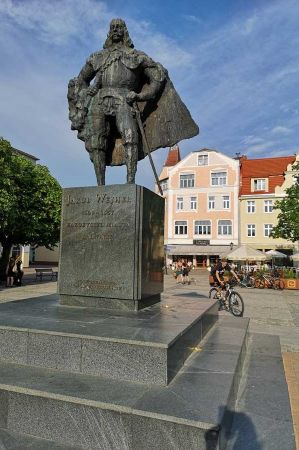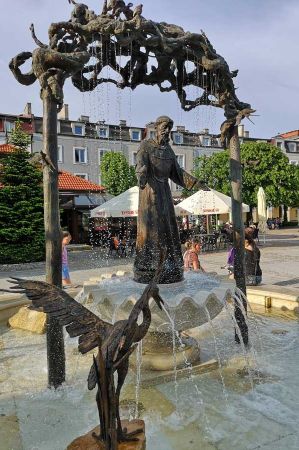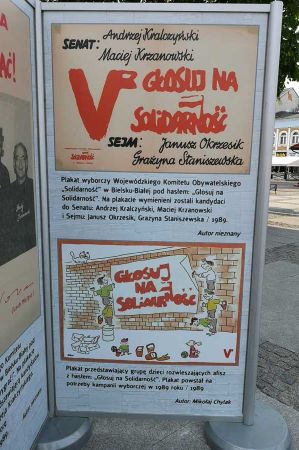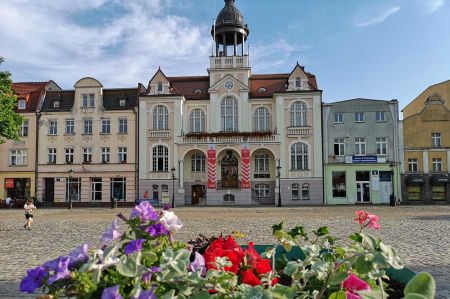Short Visit to Wejherowo - Statue of Jakob von Weiher
- Written by Portal Editor
Wejherowo calls itself the spiritual capital of the Kashubians, so it has become an important destination of pilgrims to the Holy Portrait of Our Lady, whose image was blessed in 1999 by John Paul II.
The city of Wejherowo itself is located in the historic landscape of West Prussia, in the wide glacial valley of the Rheda, west of the Gulf of Gdansk, about twenty kilometers northwest of the port city of Gdynia.
From 1308 to 1466, the landscape belonged to the German-speaking country of Prussia and then came during the division of Prussia to the western part, which was later also known as autonomous Polish-Prussia, which had voluntarily embarked on the protection of the Polish crown. 1576 the settlement Schmechau got, next to the future city of Wejherowo, under the rule of Putziger starost Ernst von Weiher (from the well-known noble family of Weiher).
Voivode of Marienburg - Jakob von Weiher
 On 28 May 1643, the voivode of the Marienburg Jakob von Weiher founded Weyersfrey, the place was named with his name, the settlement ponds near the village Schmechau and built the church of the Holy Trinity there in the same year. During the siege of Smolensk in 1633/34, Jakob von Weiher vowed to build two churches if he was to survive the siege. The second church was the Church of St. Anne, built in 1648-1651. In addition, Weiher had introduced a Way of the Cross and Calvary with 19 chapels being built, whose number later increased to 26.
On 28 May 1643, the voivode of the Marienburg Jakob von Weiher founded Weyersfrey, the place was named with his name, the settlement ponds near the village Schmechau and built the church of the Holy Trinity there in the same year. During the siege of Smolensk in 1633/34, Jakob von Weiher vowed to build two churches if he was to survive the siege. The second church was the Church of St. Anne, built in 1648-1651. In addition, Weiher had introduced a Way of the Cross and Calvary with 19 chapels being built, whose number later increased to 26.
Jakob von Weiher began his education in the Jesuit school in Braunsberg and continued it at the court of the Polish successor to the throne, Władysław IV. Wasa. He graduated from the University of Bologna. Then Weiher served in the army of the Catholic League of the Princes of the German Empire in many countries, including Malta, hence the Maltese Cross in the coat of arms of Wejherowo. In the army of Albrecht von Wallenstein during the Thirty Years' War he commanded several companies. Emperor Ferdinand II soon afterwards elevated him to a count.
In 1632, back in Poland, he served under Władysław IV Vasa as a colonel and took part in the Russian-Polish War 1632-1634, the Swedish War and the Cossack and Tatar Wars. Jakob von Weiher died after a short illness at the age of 47 and was buried in the Franciscan Church in Wejherowo.
On January 13, 1650, the city of John II Casimir received the city right to Prussian Kulmer right. It was the only one founded by a private person in Pomerania, apart from Topolno, but that lost his city rights soon again. In the same year, the town hall was built, but later destroyed several times. End of the 17th century, the city was the property of the imperial prince family Radziwill and subsequently the Sobieskis, including King John III. Sobieski. Later, Count Przebendowski became the owner and subsequently the English consul in Gdańsk, Alexander Gibson.
In 1701, in the meantime designated Neustadt city, as in many cities, witch trials took place.
1723 named after the founder Weihersfrei, formerly Weyersfrey was listed in the Scriptorum Prutenicorum of the Prussian historian David Brown.
Division of Poland and influx of German-speaking settlers
 By the first Polish division of 1772 western Prussia with the area around Putzig and Neustadt under Frederick II of Prussia came to the Kingdom of Prussia. In 1785, Neustadt or Weyersfrey, Polish Weyherowo or Nusdz, is referred to as a noble Mediat town with a Catholic branch church of Gohra, a Franciscan Reformation monastery on Rheda and Bialla and with a stately grinding, walking and cutting mill, that has 130 fireplaces (households).
By the first Polish division of 1772 western Prussia with the area around Putzig and Neustadt under Frederick II of Prussia came to the Kingdom of Prussia. In 1785, Neustadt or Weyersfrey, Polish Weyherowo or Nusdz, is referred to as a noble Mediat town with a Catholic branch church of Gohra, a Franciscan Reformation monastery on Rheda and Bialla and with a stately grinding, walking and cutting mill, that has 130 fireplaces (households).
In 1818 Neustadt became the seat of its own Prussian district Neustadt (Westpr.). During this time, the proportion of German-speaking inhabitants rose to almost 50% (in the Prussian census of 1905 27,358 inhabitants Kashubian and 27,048 German as mother tongue). In 1870, the city was connected to the railway network and received a direct connection to Gdansk and Szczecin.
After the end of the First World War, the district Neustadt, like the greater part of West Prussia, had to be given to Poland for the purpose of the establishment of the Polish Corridor in 1920, without referendum and with effect from January 20, 1920. Neustadt then became renamed Wejherowo. In 1921 the newspaper "Gazeta Kaszubska" (Kashubian newspaper) appeared.
Changing history due to the world wars
 As a result of the Polish campaign in 1939, the removed territory of the Polish Corridor was annexed by the German Reich. The district with the city of Neustadt in West Prussia was incorporated into the Reichsgau Danzig-West Prussia, to which Neustadt belonged until 1945.
As a result of the Polish campaign in 1939, the removed territory of the Polish Corridor was annexed by the German Reich. The district with the city of Neustadt in West Prussia was incorporated into the Reichsgau Danzig-West Prussia, to which Neustadt belonged until 1945.
Already before September 27, 1939 psychiatry patients were murdered in Neustadt by the German occupiers. Subsequently, a German military hospital was set up in the affected clinic. In 1940, several spare parts of the Wehrmacht were housed in the city. During the time of the incorporation of the city in the Reichsgau Danzig-West Prussia, the Polish underground organization Gryf Pomorski was active in the area.
Towards the end of the Second World War on 12 March 1945, the Red Army occupied the city, which was again part of Poland afterwards. The immigration of Polish civilians began in Neustadt. As place name, Wejherowo was introduced again. As far as the German inhabitants had not fled, they were largely expelled in the following period.
In an administrative reform in 1975, the city lost its seat as a powiat, but received it back in a renewed reform in 1999.
Please read as well:
By bike along the bike path on the Hel peninsula
Dumplings - with a colourful salad and carrot-ginger juice
-
 City Impressions Wejherowo - Poland
City Impressions Wejherowo - Poland
City Impressions Wejherowo - Poland
City Impressions Wejherowo - Poland
-
 City Impressions Wejherowo - Poland
City Impressions Wejherowo - Poland
City Impressions Wejherowo - Poland
City Impressions Wejherowo - Poland
-
 City Impressions Wejherowo - Poland
City Impressions Wejherowo - Poland
City Impressions Wejherowo - Poland
City Impressions Wejherowo - Poland
-
 City Impressions Wejherowo - Poland
City Impressions Wejherowo - Poland
City Impressions Wejherowo - Poland
City Impressions Wejherowo - Poland
-
 City Impressions Wejherowo - Poland
City Impressions Wejherowo - Poland
City Impressions Wejherowo - Poland
City Impressions Wejherowo - Poland
-
 City Impressions Wejherowo - Poland
City Impressions Wejherowo - Poland
City Impressions Wejherowo - Poland
City Impressions Wejherowo - Poland
-
 City Impressions Wejherowo - Poland
City Impressions Wejherowo - Poland
City Impressions Wejherowo - Poland
City Impressions Wejherowo - Poland
-
 City Impressions Wejherowo - Poland
City Impressions Wejherowo - Poland
City Impressions Wejherowo - Poland
City Impressions Wejherowo - Poland
-
 City Impressions Wejherowo - Poland
City Impressions Wejherowo - Poland
City Impressions Wejherowo - Poland
City Impressions Wejherowo - Poland
https://www.alaturka.info/en/poland/gdansk/4840-short-visit-to-wejherowo-statue-of-jakob-von-weiher#sigProId706af07df9

